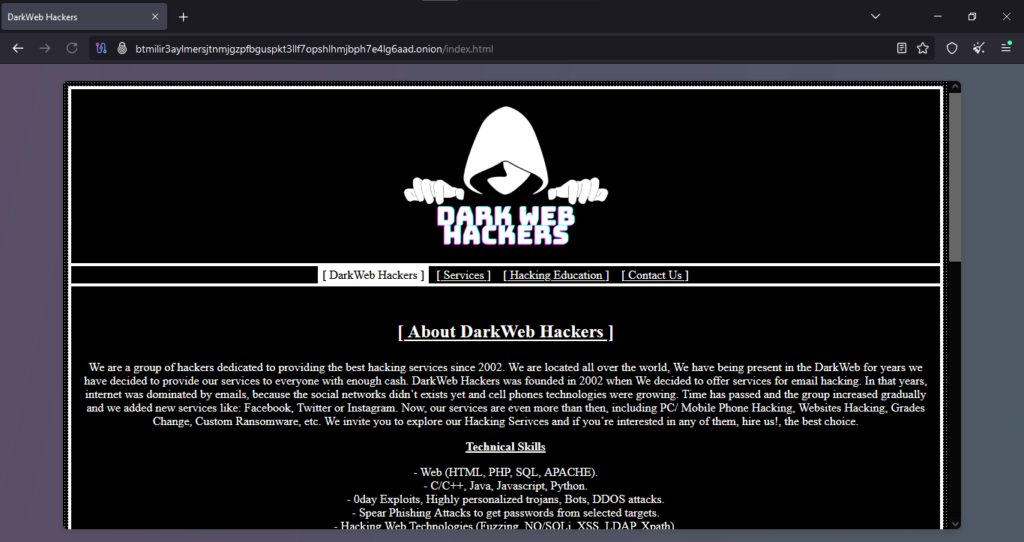Table of Contents
ToggleDark Web Hackers – TOR Scam Report (79)
Onion Link : http://btmilir3aylmersjtnmjgzpfbguspkt3llf7opshlhmjbph7e4lg6aad.onion/index.html
Scam Report Date : 2024-11-18
Client Scam Report Breakdown
Original Scam Report :
The client’s report describes an attempted purchase of a hacking service from a website, specifically to hack an iPhone. The concise statement highlights a failed transaction involving an illegal service and indicates potential fraudulent activity. The absence of communication from the seller after payment is a red flag for scams prevalent in such online environments.
Analysis of the Scam Incident
This report illustrates a non-delivery scam, where the seller solicits payment but fails to deliver the promised service or product. In this case, the client sought an unauthorized service—hacking an iPhone. Such services are commonly advertised on underground websites or deep web platforms, where anonymity is prioritized, and scams are rampant due to the lack of accountability. The client made payment using bitcoins, a cryptocurrency often employed in these transactions because of its pseudonymous nature, which makes tracing the recipient difficult and disputes nearly impossible to resolve.
The report also mentions that despite “repeated requests,” the client received no further information. This indicates either deliberate avoidance by the seller or the possibility that the website was designed to scam users entirely. Sellers of illicit services often rely on pretense and obfuscation to extract payments without ever intending to fulfill their promises. Without a formal resolution mechanism, buyers are left without recourse. This reinforces the risks associated with engaging in transactions for illegal goods or services.
Definition of Key Terms and Conclusion
To better understand the nature of this scam, here are key terms from the report:
- Non-Delivery Scam: A fraudulent scheme where a seller accepts payment but fails to deliver the promised goods or services.
- Hacking Services: Illegal services offered to gain unauthorized access to devices or systems, often violating cybersecurity laws.
- Bitcoin: A cryptocurrency that operates on a decentralized blockchain, valued for its anonymity in transactions but frequently misused in scams.
- Deep Web Platforms: Websites not indexed by standard search engines, often associated with illicit activities due to their use of anonymizing technologies like Tor.
In conclusion, the client was a victim of a non-delivery scam involving an illegal hacking service. This incident highlights the significant risks of engaging with unregulated websites, particularly when payments are made with cryptocurrencies. The lack of a centralized authority or dispute resolution mechanisms exacerbates these risks. While this experience serves as a cautionary tale, it also underscores the broader challenges of combating fraudulent activities in online spaces, especially those promoting illegal services. Potential buyers should remain vigilant and avoid platforms that offer unlawful or unethical services, as these are rife with scams and legal consequences.







